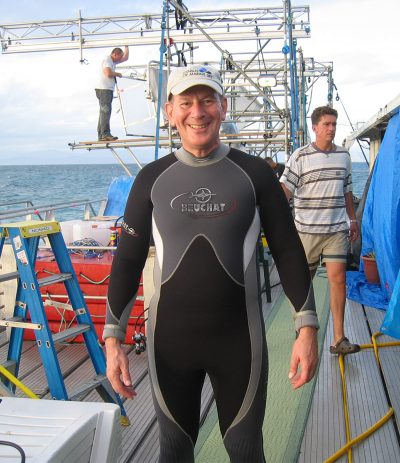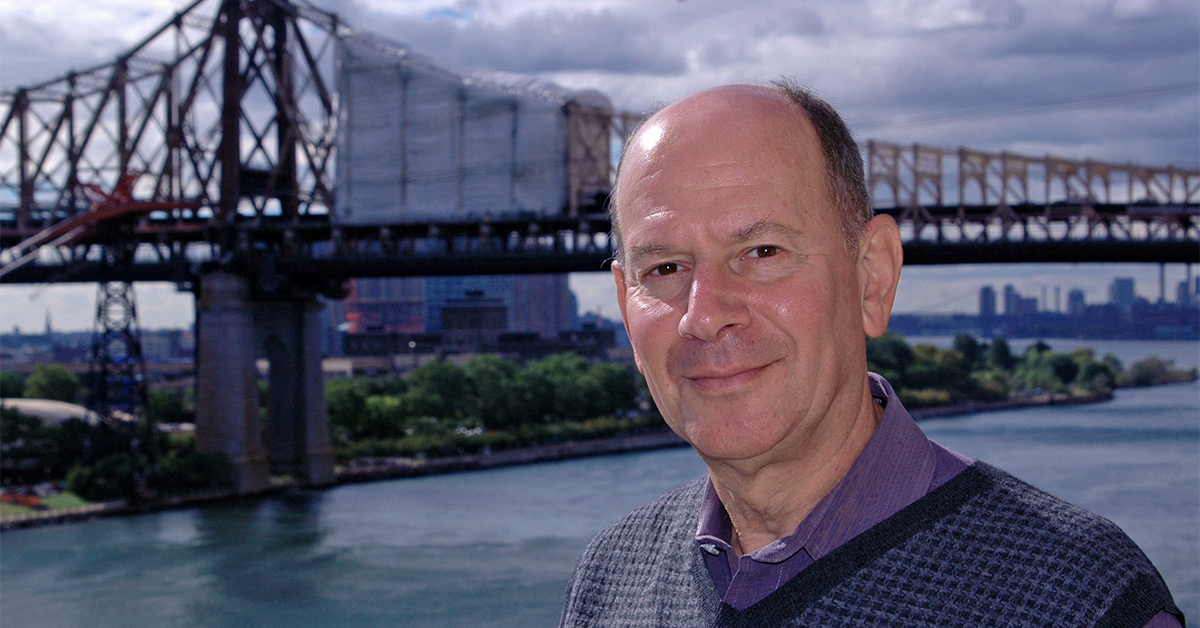Environmental Scientist Jesse Ausubel to Receive 2022 Nierenberg Prize
Ausubel to deliver a free public lecture at Scripps Institution of Oceanography on Oct. 13
Story by:
Published Date
Article Content
Renowned environmental scientist Jesse H. Ausubel will be honored with the 2022 Nierenberg Prize for Science in the Public Interest. This award is presented annually by Scripps Institution of Oceanography at UC San Diego and the Nierenberg Family to honor the memory of William A. Nierenberg, an esteemed physicist and national science leader who served Scripps Oceanography as director for two decades.
The public is invited to attend the 2022 Nierenberg Prize ceremony and a presentation from Ausubel in a free event on Oct. 13 at 6 p.m. at the Robert Paine Scripps Forum for Science, Society and the Environment on the Scripps campus. RSVP here.
His presentation, “Peak human? Thoughts on the evolution of the enhancement of human performance,” will examine whether the human species can continue to improve—much like cars, computers, or other technology—or whether our species has reached its peak.
In a career spanning more than four decades, Ausubel has conceived, developed, and led numerous projects to observe and better understand the environment. This includes high-profile work on several major programs to survey and catalog the planet’s biodiversity. In 2000, he and marine biologist Frederick Grassle of Rutgers University initiated the decade-long Census of Marine Life, an international program nurtured by the Alfred P. Sloan Foundation that assessed and explained the diversity, distribution, and abundance of life in the oceans. In 2002, Ausubel and Canadian ecologist Paul Hebert began the International Barcode of Life initiative, which provides short DNA sequences to efficiently identify all species of animals, plants, and fungi. Starting in 2006, he led the inception of the Encyclopedia of Life, a freely available online resource that aims to develop a web page for every species.
The esteemed scientist was notified about his selection to receive the 2022 Nierenberg Prize in a letter from Scripps Director Margaret Leinen. Of this Ausubel wrote, “Dr. Leinen’s letter about the Nierenberg Prize dazed me with thoughts about the luster of past awardees and the fun to follow as well as the gravity of the subject of science and society.”

Ausubel currently serves as director of the Program for the Human Environment at The Rockefeller University in New York City. The program leads research on long-term trends relevant to the environment with a goal of harnessing technology to lighten the human footprint, spare land for nature, and restore the oceans. He has also served as an executive of the Alfred P. Sloan and Richard Lounsbery foundations, program director of the National Academies, and long-term research affiliate of the Woods Hole Oceanographic Institution.
Ausubel began his career working for the U.S. National Academy of Sciences (NAS) and National Academy of Engineering (NAE) in Washington, D.C., starting with a 1977 Sloan Foundation fellowship. Shortly after, Ausubel was a main organizer of the first UN World Climate Conference in Geneva in 1979, an event which elevated global warming on scientific and political agendas and led to the creation of the World Climate Program, much of which Ausubel drafted.
In the decades that followed, Ausubel published research on climate impacts and adaptations and decarbonization, and in 1983 helped initiate the International Geosphere-Biosphere Program to understand the causes and outlook for global change. In 1991, with physicist Robert Frosch and others he originated the field of industrial ecology, the study of the network of all industrial processes as they may interact and live off each other and create opportunities for waste reduction and dematerialization.
More recently, Ausubel initiated the Deep Carbon Observatory to search for the origins and limits of life and the roots of petroleum and natural gas, and he launched the International Quiet Ocean Experiment to improve knowledge of ocean soundscapes and assess how human activities affect marine life. His group at The Rockefeller now explores how loose DNA in seawater (or eDNA) can improve knowledge of the kinds and amounts of life nearby.
The Nierenberg Prize holds significance for Ausubel as he had a personal connection with Dr. Nierenberg. The two first met in 1977 at the founding meeting of the Climate Research Board of the National Academies, where Ausubel served as a resident fellow. Ausubel also worked for Nierenberg in the 1980s, in Nierenberg’s capacities as chair of the Carbon Dioxide Assessment Committee of the Academies and the Committee on International Science of the National Science Board, the governing body of the National Science Foundation.
Recalling his experience working with and being mentored by Nierenberg, Ausubel wrote, “William Nierenberg liked risky activities that might have a high payoff. He believed society expected science to accomplish the incredible, like finding and recovering a submarine lost in the vast, deep Pacific. He encouraged me to take some of the most fruitful chances of my career, including initiating the Census of Marine Life.”
The Nierenberg Family said they were pleased the selection committee put forth Ausubel as the 2022 recipient of the Nierenberg Prize for Science in the Public Interest.
“Jesse and our father shared numerous scientific projects together, and had many broad conversations about the wonders of the physical, biological and cultural world,” said Vicki Tschinkel, William Nierenberg’s daughter. “Jesse is renowned for creating colossal collaborations to answer diverse mega questions ranging from climate change to the Census of Marine Life to investigating the source of Leonardo DaVinci’s talent. His strength, brilliance and good nature invite participation and debate from all.”
Ausubel helped found and foster several organizations, including the Partnership for Observation of the Global Oceans (POGO) and the Andrew W. Marshall Foundation. He is the recipient of numerous awards and honors for his environmental research, including the Blue Frontier/Peter Benchley prize for ocean science; membership in the American Academy of Arts and Sciences; and Japan’s International Cosmos Prize, which he shared with other leaders of the Census of Marine Life project. In the spring of 2021, the website Academic Influence ranked Ausubel as the world’s tenth most influential earth scientist.
Beyond environmental research, Ausubel has helped spur “biology in art” and the “art/bio” movement, which uses new tools in molecular biology, genetics, and microbiology for discovery in art history and for the conservation of cultural heritage.
The Nierenberg Prize, which includes a bronze medal and $25,000, is awarded for outstanding contributions to science in the public interest. Previous awardees include atmospheric scientist Warren Washington, biochemist and Nobel Prize winner Jennifer Doudna, filmmaker Sir David Attenborough, and primatologist Dame Jane Goodall, among others.
Share This:
You May Also Like
Engineers Take a Closer Look at How a Plant Virus Primes the Immune System to Fight Cancer
Technology & EngineeringStay in the Know
Keep up with all the latest from UC San Diego. Subscribe to the newsletter today.




